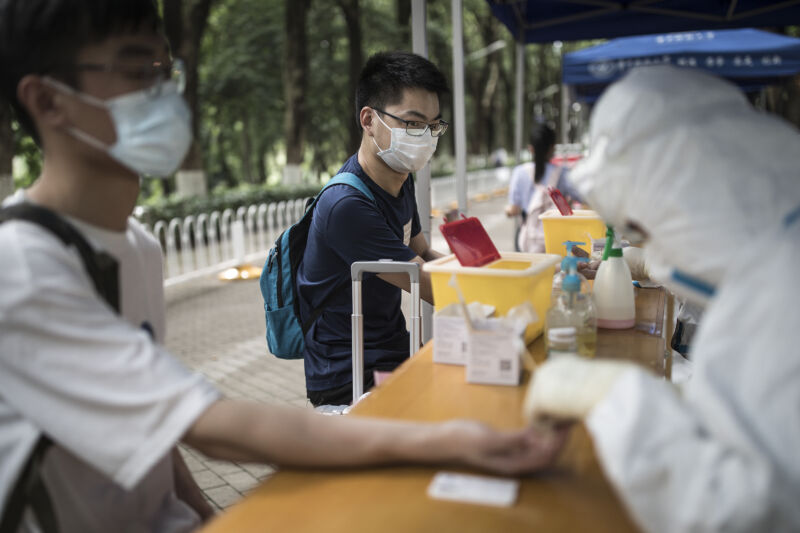
Protective immune responses that build up during a SARS-CoV-2 infection may weaken just two to three months later—particularly if the infection didn’t come with any symptoms, a new study suggests.
The finding does not necessarily mean that people will no longer be immune to the novel coronavirus after a few months. The lower levels of the immune responses measured in the study may still be enough to thwart the virus, and there are other types of immune responses not examined in the study that play a role in immunity. Overall, there are still many unknowns about potential immunity to SAR-CoV-2 infections, including who is most protected and how long that protection may last.
But the authors of the new study say that their findings are enough to raise more concerns about the potential use of so-called “immunity passports”—documents indicating someone is immune based on past infection. The authors—a team of researchers in Chongqing, China—also suggest that their findings support the continued use of physical distancing and other prevention efforts until we have a clearer understanding of immunity.
“The strength and duration of immunity after infection are key issues for ‘shield immunity’ and for informing decisions on how and when to ease physical distancing restrictions,” the write. Their study appeared Thursday in Nature Medicine.
Case tracking
For the study, the team looked at immune responses in asymptomatic and symptomatic COVID-19 patients shortly after their infection and then two to three months later. The study was small, only including 37 asymptomatic cases, but it is the among the first to look at detailed immune responses in people who never develop symptoms in the course of their infection.
The asymptomatic cases were identified by contact tracing from known cases, then isolated in a hospital for the entirety of their infection. The 37 were identified out of a total of 178 cases in the Wanzhou District of Chongqing, for an asymptomatic case rate of 21 percent. Though none developed noticeable symptoms, more than half had abnormalities in their chest scans during their infection.
The researchers compared their immune responses to those from 37 people who had cases of symptomatic COVID-19. These symptomatic controls were matched to the asymptomatic cases by sex, age, and underlying health conditions.
Asymptomatic cases shed viral genetic material from their throats longer than the symptomatic cases—a median of 19 days compared with 14 days, respectively. However, presence of viral genetic material doesn’t necessarily reflect infectious viral particles, so it’s unclear if asymptomatic cases were infectious for longer than symptomatic cases.
Troubling declines
About three to four weeks after each cases’ initial exposure, the researchers looked for antibodies—that is, Y-shaped proteins that the immune system makes to identify and disarm germs the body has already encountered. Overall, the asymptomatic cases had lower levels of anti-coronavirus antibodies than their symptomatic counterparts. They also had lower levels of inflammatory immune signals.
When the researchers looked at antibody levels again eight weeks after each case was discharged from the hospital, they found that both groups had significant declines in antibodies. In the asymptomatic group, 40 percent had no detectable levels of one type of antibody—IgG—while 13 percent of symptomatic cases had no detectable levels. For comparison, in people who had been infected with SARS-CoV-2’s relative, SARS-CoV (the coronavirus that causes SARS), researchers have seen sustained IgG levels for more than 2 years.
But not all antibodies are equally effective at thwarting invading viruses, like SARS-CoV-2. The most effective are called neutralizing antibodies. The researchers of the new study specifically looked for these antibodies using an engineered pseudovirus designed to mimic SARS-CoV-2 as bait. The researchers found that 8 weeks after recovering, neutralizing antibody levels were still present—but they had declined in 81 percent of asymptomatic cases and 62 percent of symptomatic cases.
What this means for immunity is not yet clear. Another study published Thursday in Nature found that some neutralizing antibodies present at low levels are also the most potent—potentially hinting that low levels may be enough to protect against infection. But, researchers do not know this yet.
The authors of the Nature Medicine study say that more antibody studies “profiling more symptomatic and asymptomatic individuals are urgently needed to determine the duration of antibody-mediated immunity.”
Nature Medicine, 2020. DOI: 10.1038/s41591-020-0965-6 (About DOIs).
https://arstechnica.com/?p=1685196

